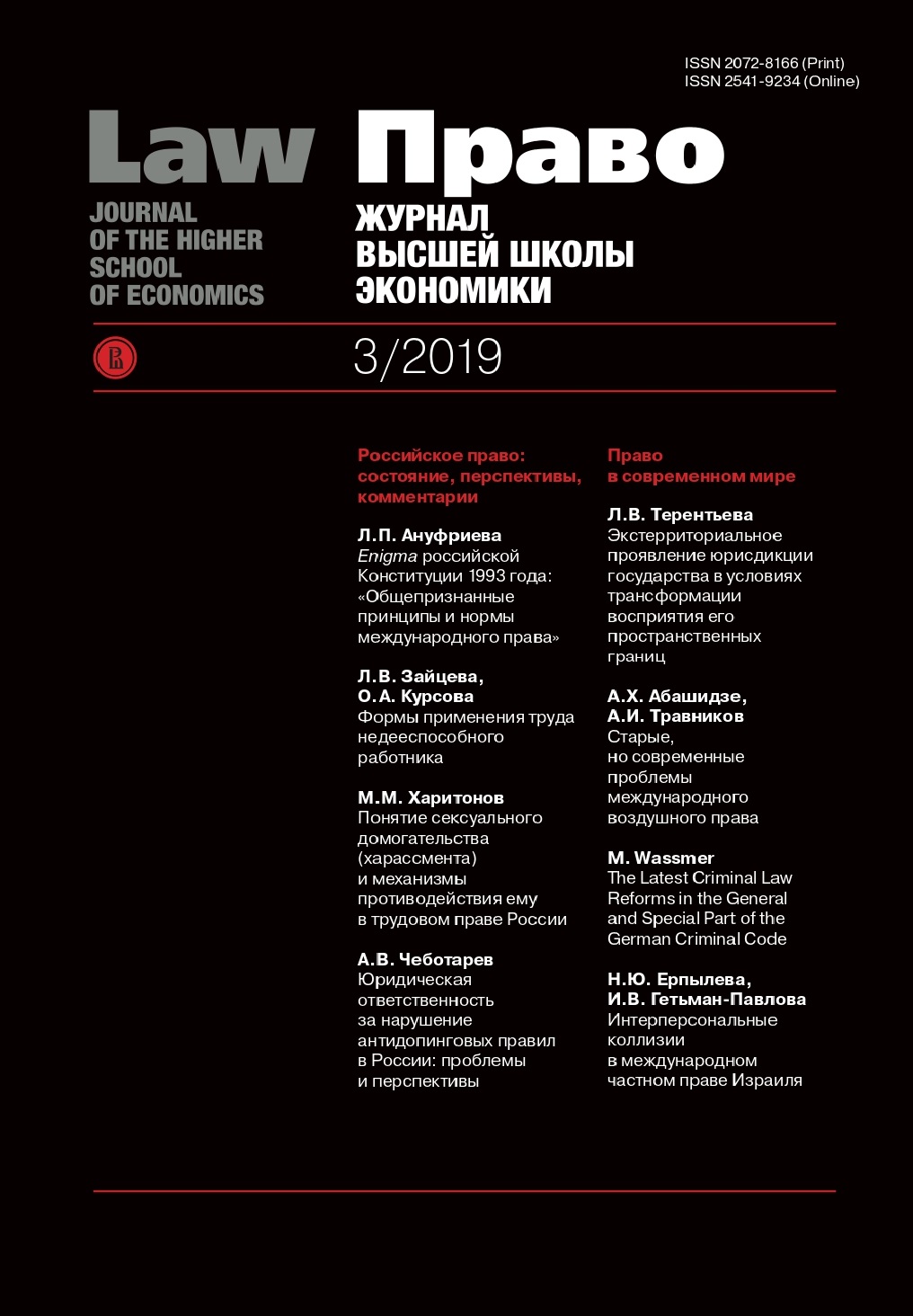Enigma российской Конституции 1993 года: «Общепризнанные принципы и нормы международного права»
Аннотация
Международное право, будучи самостоятельной системой, обладает немалой спецификой, которая не в последнюю очередь проявляется и в наличии у него особой составляющей — системы принципов. В статье рассмотрен специфический аспект, касающийся общепризнанных принципов и норм международного права как категории юридической науки, в нетипичном ракурсе отыскания истоков введения термина в российскую правовую систему на фоне анализа состояния и тенденций международной практики в этом отношении. Понятие «общепризнанные принципы и нормы международного права» стало неотъемлемой частью современного российского правоведения и юридической практики в целом благодаря именно положениям Конституции Российской Федерации (1993), образуя ныне важный пласт истории конституционного развития нашего государства, который тем не менее до сих пор не получил полноценного освещения в правовой литературе. Наряду с этим известно, что указанный термин соседствует в международном праве и изучающей его науке с иными понятиями, также входящими в разряд обозначений принципов, — «основными принципами», «общими принципами права, признанными цивилизованными нациями», jus cogens и др., что, в свою очередь, требует соответствующего в них ориентирования. Автором с использованием историографического подхода и теоретических позиций, выработанных международно-правовой наукой, поставлена цель ответить на некоторые вопросы, связанные с содержанием как поставленного во главу угла в статье предмета «общепризнанные и принципы и нормы международного права» и его составных элементов, так и с его соотношением и связью с другими вышеуказанными явлениями, в частности, с «основными принципами международного права», во-первых, и нормами jus cogens («императивными нормами общего международного права»), во-вторых. Такой подход позволил осуществить более глубокое погружение в существо анализируемых понятий. Особым объектом внимания при их рассмотрении выступают результаты разработки понятия jus cogens Комиссией международного права Организации Объединенных Наций.
Литература
Abashidze A.H. (2017) Principles of International Law: Concept and Terminology Moscovskyi zhurnal mezhdunarodnogo prava, no 4, pp. 19-29 (in Russian)
Aleksidze L.A. (1982) Issues of the Theory of International Law. Tbilisi: University Press, 406 p. (in Russian)
Avak'yan S.A. (2000) The Constitution of Russia. Moscow: RYID Press, 528 p. (in Russian)
Berestnev Yu.Yu. (ed.) (2016) Guide to Precedential Practice of the European Court of Human Rights 2002-2016. Moscow: Razvitie pravovykh system, 1288 p. (in Russian)
Bobrov R.L. (1962) Contemporary International Law. Leningrad: University Press, 114 pp. (in Russian)
Bobrov R.L. (1968) Major Issues of the Theory of International Law. Moscow: Mezhdunarodnye otnosheniya, 272 pp. (in Russian)
Chernichenko S.V. (2012) Interplay between Peremptory Norms of International Law and Obligations erga omnes. Moscovskyi zhurnal mezhdunarodnogo prava, no 3, pp. 3-16 (in Russian)
Chernichenko S.V. (2014) Outline of International Law. General Issues. Moscow: Nauchnaya kniga, 592 p. (in Russian)
D'Amato A. (1990) It's a bird, it's a plane, it's jus cogens! Connecticut Journal of International Law, no 1, pp. 1-6.
Ispolinov A.S. (2014) Jus cogens in the Judgements of International and Municipal Courts. Rossiyskiy juridicheskiy zhurnal, no 6, pp. 7-14 (in Russian)
Harris D., O'Boyle M., Warbrik C. (2017) Pravo Evropeyskoi konventsii po pravam cheloveka. Moscow: Razvitie pravovykh system, 1342 p. (in Russian)
Kleinlein T. (2016) Jus Cogens as the ‘Highest Law’? Peremptory Norms and Legal Hierarchies. Netherlands Yearbook of International Law 2015: Jus Cogens — Quo Vadis? (ed.). Amsterdam: Springer, vol. 46, pp. 173-210.
Konovalov A.V. (2018) On the Concept of Principles of Law. Lex Russica, no 8, pp. 81-87 (in Russian)
Korovin E.A. (1951) On the Generally Recognized Norms of the International Law. Sovetskoe gosudarstvo i pravo, no 9, pp. 14-19 (in Russian)
Marochkin S.Yu. (2019) The Operation of International Law in the Russian Legal System. A Changing Approach. Brill/Nijhoff, Asian Law Series, vol. 8, 308 p.
Minasyan N.M. (1960) The Sources of Contemporary International Law. Rostov: University Press, 152 pp. (in Russian)
Morozov A.N. (2018) Reflection of Generally Recognized Principles of International Law in the Constitution. Journal of Russian Law, no 7, pp. 33-45 (in Russian)
Nefedov B.I. (2019) Principles in the International Law: Terminology. Moscow Journal of International Law, no 1, pp. 6-17 (in Russian)
Neshataeva T.N. (2004) The Court and the Generally Recognized Principles and Norms of International Law. Vestnik Vysshego arbitrazhnogo suda, no 3, pp. 124-140 (in Russian)
Pushmin E.A. (1979) Concept of Major Principles of Contemporary International Law. In: Soviet Yearbook of International Law. Moscow: Nauka, pp. 76-84 (in Russian)
Sheyndlin B.V. (1959) Essence of Soviet Law. Leningrad: University Press, 140 p. (in Russian)
Shestakov L.N. (1981) Concerning the problem of identification of the norms jus cogens in the International Law. In: Soviet Yearbook of International Law. Moscow: Nauka, pp. 66-76 (in Russian)
Shaw M. (2008) International Law. 6th ed. Cambridge: University Press, 1708 pp.
Simma B. (ed.). (2002) The Charter of the United Nations. A Commentary. N.Y.: Oxford University Press, 895 p.
Talalaev A.N. (1959) Major Principles of the International Law. Soviet Yearbook of International Law. Moscow: Nauka, pp. 513-515 (in Russian)
Tolstik V.A. (2000) Generally Recognized Principles and Norms of International Law within the Legal System of Russia. Journal of Russian Law, no 8, pp. 67-77 (in Russian)
Verdross A. von (1937) Forbidden Treaties in International Law. American Journal of International Law, no 31, pp. 571-574.
Wet de E. (2004) The Prohibition of Torture as an International Norm of Jus Cogens and Its Implications for National and Customary Law. European Journal of International Law, no 1, pp. 97-121.
Copyright (c) 2019 Право. Журнал Высшей школы экономики

Это произведение доступно по лицензии Creative Commons «Attribution-ShareAlike» («Атрибуция — На тех же условиях») 4.0 Всемирная.


















